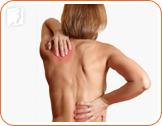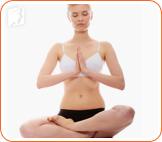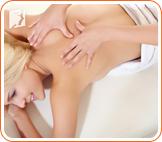Muscle tension can happen for a range of reasons, such as a job that requires long days of sitting or built-up stress and anxiety. Hormonal changes during menopause and other symptoms of menopause can exasperate muscle tension and tension headaches.

The symptoms of muscle tension include the tightness of muscles - especially in the back, shoulders, neck, and abdomen - muscle tenderness, fatigue, tension headaches, muscle pain, and muscle spasms. However, there are ways to relieve muscle tension and soothe tension headaches.
Five Stress Relief Techniques for Muscle Tension
These techniques can largely be done at home to relieve mild to moderate muscle tension.
Hot and cold Compress
Use a hot or cold compress to relieve tension in the muscles in the back or on other parts of the body. Using a cold compress followed by a warm compress can be extra helpful.
Exercise

Taking a break from work by walking around outside can do a lot to relieve muscle tension. Exercising regularly can also release muscle tension. Good exercises to try are swimming, jogging, aerobics, and yoga. Yoga incorporates deep breathing techniques with moving and static poses, and is considered one of the best ways to relieve stress. The poses improve circulation and will send blood to all the muscles in the body, allowing them to relax. It is harder to fit into your everyday routine, and requires a great deal of practice because it needs to be done in the correct way, but if done frequently enough, it can greatly lessen stress.
Meditation and breathing exercises

These are an effective way to slow your body and brain down while boosting blood flow. Meditation will relax your muscles and ease stress and anxiety. Meditation helps focus on the way each part of the body feels, which helps release tension and negativity.
Massage and stretching

This can be the best technique if you want to deal with the problem directly. Getting a massage provides deep relaxation for the muscles in your body, including your head if you have tension headaches. Massages help reduce muscle tension because they improve the blood flow to the muscles. Visit a spa, enjoy the benefits of a massage, and let your mind wander to a place where there is no stress. You can also give yourself a massage, and that will help to instantly relieve tension. Regular stretching in the morning and throughout the day can also help.
Cut back on caffeine
Caffeine can increase anxiety, which can cause a lot of muscle tension. Caffeine addiction can also lead to withdrawal symptoms, such as intense headaches, if you go without it. It is not necessary to completely cut caffeine out of your life, but reevaluating how much caffeine you consume can be beneficial.
More Information about Muscle Tension
Muscle tension commonly occurs in many people, and is often the result of built-up stress and anxiety. However, regularly exercising, stretching, and utilizing relaxation techniques and compresses can help relieve this ailment. Find out more about how to deal with this menopausal symptom and how a fluctuation in hormone levels can affect it.
Sources
- Mayo Clinic Staff. (2014). Relaxation techniques: Try these steps to reduce stress. Retrieved November 20, 2015, from http://www.mayoclinic.org/healthy-lifestyle/stress-management/in-depth/relaxation-technique/art-20045368
- University of California Berkeley. (2009). Staying Healthy During Stressful Times. Retrieved November 20, 2015, from https://uhs.berkeley.edu/home/news/pdf/headaches.pdf



